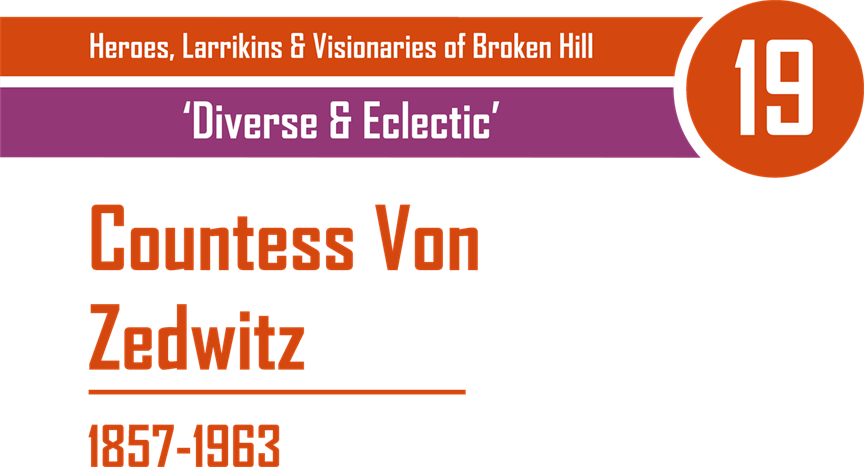Countess Von Zedwitz

Agnes Klaversahl was working as a waitress in a coffee shop in Adelaide when, in 1883, she met fellow German immigrant and agricultural worker Charles Rasp. He was visiting from Broken Hill and had with him a lump of ore to be assayed for silver content. Neither of them could have known that Rasp would one day be known as the Silver King and she the Countess of Adelaide.
Agnes and Charles were married in 1886, a year after the Broken Hill Proprietary Company (BHP) was formed. They honeymooned in Broken Hill, where by now wealthy pastoralists had begun buying into BHP, and mining operations were underway. Agnes Rasp was probably the first woman to go underground. In 1887, the same year BHP registered a profit of £200,000, the Rasps bought Willyama, a bluestone mansion in Medindie, South Australia. The socially anxious Agnes set to work entertaining, fortified by a ballroom and a dining room large enough to host all of Adelaide society.
When Charles Rasp died of a heart attack in 1907, Agnes was wealthy and well-connected enough to travel through Europe and to socialise in the Hapsburg Court. She was soon engaged to Baron Richard von Eisenstein who, at almost 70, was twenty years her senior. One story casts the engagement as a contract: the exchange of a title for a fortune, since it was rumoured that Baron von Eisenstein was teetering on the edge of financial ruin. When he died, also of a heart attack, the day before the wedding, the rumour-mill was extremely busy. Agnes fortuitously met another Baron: Count Karl Joseph von Zedtwitz, and they married in London in 1914. This was not an easy time to be a German in Britain.
The Count and Countess von Zedtwitz lived in Leipzig and Berlin during WWII but the count died not long after the end of the war. In 1921, Agnes could finally return to Adelaide, to Willyama, as a true countess. But in her absence, all her Australian assets had been confiscated under the Enemy Property Act, and it took a special act of parliament, sponsored by Billy Hughes, to return her property to her. When she died in 1936, aged 79, Agnes, Countess of Adelaide, held an estate worth £120,000.